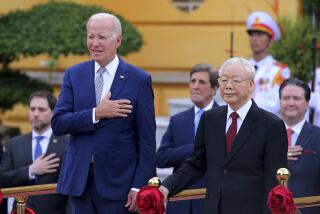Hopes for a Vietnam Trade Shift
- Share via
When Nghia Van Phi first returned home to Vietnam in 2003, he still carried animosities toward the Communist government he had fled nearly three decades earlier.
But Phi, president of a Santa Ana discount home improvement outlet, has since become an enthusiastic supporter of the economic rebuilding of that country. His company, US HiFi Inc., a scaled-down version of Home Depot that caters to the Vietnamese American community, imports 70% of its ceramic tiles, solid oak entry doors and other home products from Vietnam.
That’s why Phi hopes Congress will act soon on a bill that would establish “permanent normal trade relations” with Vietnam, the final step in freeing up trade and investment between the former adversaries. During the Cold War, most Communist countries were denied that trade status, which meant they paid higher tariffs on goods exported to the U.S.
Supporters hope to pass the legislation before Vietnam joins the World Trade Organization, the Geneva-based global trade group. Leaders in Hanoi want to finalize their WTO bid by November, when they host President Bush and Asian leaders for this year’s meeting of the Asia-Pacific Economic Cooperation forum.
Vietnam hopes to replicate the success of China, which saw its global prestige and trade volume soar after it joined the WTO in 2001. To secure the country’s membership, Hanoi officials have agreed to lower tariffs, remove barriers to foreign retailers and banks, strengthen the judicial system and crack down on corruption.
The U.S. Chamber of Commerce and other business leaders expect the Vietnam bill to be approved, given the bipartisan support from congressional leaders who served in the war, including Sens. John McCain (R-Ariz.), Chuck Hagel (R-Neb.) and John F. Kerry (D-Mass.). But it is unclear when the legislation can be squeezed into Congress’ crowded summer agenda.
Vietnam could still enter the WTO without the U.S. approval, but trade between the country and the U.S. would not be governed by global rules, putting U.S. firms at a disadvantage, the bill’s supporters say.
Passage of permanent normal trade relations with Vietnam wouldn’t have much of an immediate effect on Phi, because the goods he imports already have low tariffs and he hasn’t directly invested money there. But he says normalized relations would have the psychological benefit of clearing away the final barrier between the U.S. and Vietnam, plus it would encourage the Communist government to continue moving toward greater economic and political openness.
Phi also believes that full normalization between the two countries would lessen hostility among Vietnamese Americans toward the government of Vietnam, making it easier for them to do business with their homeland.
“The people in my country are very smart, very hardworking,” said Phi, 53, whose company imports as many as seven container loads a month from Vietnam. “If Americans give Vietnam the chance to open up and step into the WTO, the life of my people will change.”
Human rights groups, however, have raised concerns about Vietnam’s harsh treatment of political dissidents, ethnic minorities and Christians. Vietnam’s bid is also opposed by some U.S. textile and apparel makers, who contend that its entry into the WTO would reward another Asian exporting juggernaut that has used unfair trade practices to bolster its textile and apparel exports at the expense of U.S. competitors.
After the U.S. and Vietnam signed a bilateral treaty in 2001, two-way trade jumped from $1.5 billion to $7.8 billion. The biggest beneficiaries were Vietnamese textile and apparel makers, whose exports to the U.S. increased 6,000% over that period, according to the American Manufacturing Trade Action Coalition, a domestic lobbying group. Over the last year, Vietnam shipped $3.1 billion worth of textiles and apparel to the U.S.
“We’re talking about making the same mistake with Vietnam that we did with China,” said group spokesman Lloyd Wood in Washington.
But Virginia Foote, president of the U.S.-Vietnam Trade Council, a business lobbying group, said Vietnam wasn’t even close to having China’s clout in the U.S. marketplace. Even with its recent export spurt, Vietnam represents less than 4% of the U.S. textile and apparel market, she said.
The Vietnamese government has improved its business climate in anticipation of joining the WTO, said Walter Blocker, managing partner of Gannon Vietnam Ltd. and chairman of the American Chamber of Commerce in Ho Chi Minh City. That includes the passage of more than 50 laws since 2004.
Blocker predicted that U.S. investment in Vietnam would rise sharply once WTO membership was finalized, given the country’s attractive domestic market and low production costs. More than half of Vietnam’s 84 million people are younger than 30, and they are enthusiastic consumers of U.S. culture, including products as varied as movies and mascara.
Blocker, who distributes a number of top U.S. brands including Maybelline and L’Oreal cosmetics, said the Vietnamese spend $350 million to $400 million a year on “non-shampoo cosmetics,” a market that barely existed 12 years ago.
“Now we have 20% to 25% of the women coloring their hair,” said Blocker, who helped launch the country’s cosmetics revolution by setting up lipstick counters in Vietnamese markets more than a decade ago.
Vietnam’s 90% literacy rate and low labor costs (as low as half the cost of China) also make the country an appealing platform for regional production, Blocker said. And for U.S. firms worried about becoming entangled in political disputes between the U.S. and China, Vietnam offers a more stable location, he said.
After considering sites in China, India and Thailand, Intel Corp. announced this year that it would build a $300-million chip assembly and test facility in a government-owned industrial park on the outskirts of Ho Chi Minh City. Intel plans to begin construction on that plant by year-end and hopes to start commercial production in 2009.
Intel country manager Than Phuc said the Vietnamese government offered the Santa Clara, Calif.-based chip maker an attractive incentive package, including cheap land and power, tax incentives and training subsidies. But he said the clincher was the government’s willingness to address the company’s concerns, such as the delays caused by the country’s antiquated customs processing system.
“The thing that impressed our management the most was the open and frank way the government spoke with Intel,” he said.
Than said one of the Vietnamese government’s priorities was creating jobs for the 1 million-plus people entering its workforce every year, which is why it has focused on attracting large foreign companies. Intel has said its facility, which represents the largest investment in Vietnam by a U.S. company, will eventually create 1,200 jobs.
But Than, who is based in Ho Chi Minh City, hopes Vietnam’s entry into the WTO will encourage more Vietnamese Americans to bring their talents and money to the Asian nation. He pointed to the success of Highlands Coffee, a Starbucks-style chain of coffeehouses started by a Vietnamese American.
“The U.S. is my home, but I don’t have a return ticket,” said Than, whose family fled Vietnam in one of the last helicopters to lift off from the U.S. Embassy rooftop in 1975. “Someday I will have a home here and a home in the U.S. I think it is most Vietnamese Americans’ dream.”
Some Vietnamese American leaders remain strongly opposed to lifting the final trade barriers until their homeland is “free and democratic,” said Hieu T. Nguyen, president of First Vietnamese American Bank in Westminster, which was set up last year to serve the 300,000 Vietnamese Americans living in Southern California.
But Nguyen said he, like many other Vietnamese Americans, views Vietnam’s entry into the global economy as inevitable, and hopes that the government’s embrace of free markets will eventually result in greater political freedoms.
Of Vietnam’s WTO bid, Nguyen said: “No one can stop it.”
More to Read
Inside the business of entertainment
The Wide Shot brings you news, analysis and insights on everything from streaming wars to production — and what it all means for the future.
You may occasionally receive promotional content from the Los Angeles Times.









